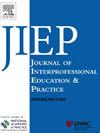Family members’ experience of involvement in the patient care process on an interprofessional training ward: A qualitative interview study
Q3 Social Sciences
Journal of Interprofessional Education and Practice
Pub Date : 2025-03-05
DOI:10.1016/j.xjep.2025.100742
引用次数: 0
Abstract
Background
Involving family members in the care process leads to higher-quality patient care. However, this requires collaboration among various healthcare professionals. At interprofessional training wards, healthcare students learn to work together across different disciplines. However, there is limited knowledge about family member's involvement in the patient care process during interprofessional education in clinical settings.
Aim
This study aimed to explore family members’ experience of involvement in the patient care process on an interprofessional training ward.
Method
An inductive content analysis was applied on data from individual interviews with 19 family members of patients admitted to an interprofessional training ward.
Results
Family members experienced that they had to be involved in the patient care process to bridge knowledge between the patient and the interprofessional student team in order to influence healthcare and have control over the situation. Moreover, they wanted to be acknowledged as family members and needed transparency in the patient care process. Family members' involvement was governed by the patient's needs and influenced by the degree of trust in the interprofessional student team.
Conclusion
Interprofessional education activities should focus more on family members’ involvement in the interprofessional training ward.
家庭成员参与跨专业培训病房病人护理过程的经验:一项质性访谈研究
背景:让家庭成员参与到护理过程中可以提高病人的护理质量。然而,这需要各种医疗保健专业人员之间的协作。在跨专业培训病房,医疗保健学生学习跨不同学科的合作。然而,在临床设置的跨专业教育中,关于家庭成员参与患者护理过程的知识有限。目的本研究旨在探讨家庭成员参与跨专业培训病房病人护理过程的经验。方法采用归纳性内容分析法,对19例跨科培训病房住院患者家属进行个人访谈。结果家庭成员体验到他们必须参与患者护理过程,以在患者和跨专业学生团队之间建立知识桥梁,从而影响医疗保健并控制情况。此外,他们希望被视为家庭成员,并在病人护理过程中需要透明度。家庭成员的参与受患者需求的支配,并受跨专业学生团队信任程度的影响。结论跨专业培训病房的跨专业教育活动应注重家属的参与。
本文章由计算机程序翻译,如有差异,请以英文原文为准。
求助全文
约1分钟内获得全文
求助全文
来源期刊

Journal of Interprofessional Education and Practice
Social Sciences-Education
CiteScore
1.60
自引率
0.00%
发文量
80
期刊介绍:
Journal of Interprofessional Education & Practice, a quarterly online-only journal, provides innovative ideas for interprofessional educators and practitioners through peer-reviewed articles and reports. Each issue examines current issues and trends in interprofessional healthcare topics, offering progressive solutions to the challenges facing the profession. The Journal of Interprofessional Education & Practice (JIEP) is affiliated with University of Nebraska Medical Center and the official journal of National Academies of Practice (NAP) and supports its mission to serve the public and the health profession by advancing education, policy, practice & research.
 求助内容:
求助内容: 应助结果提醒方式:
应助结果提醒方式:


